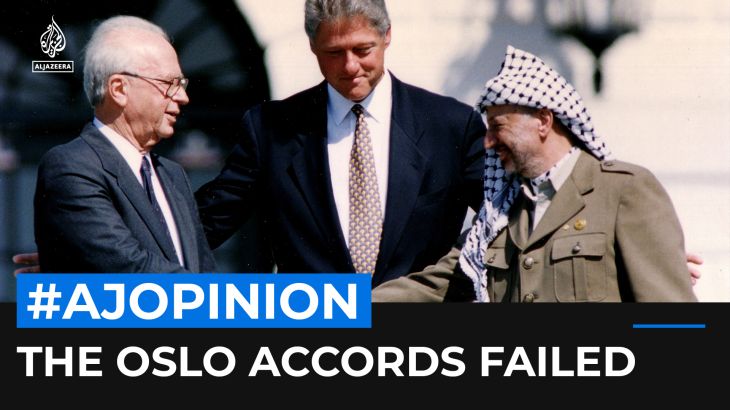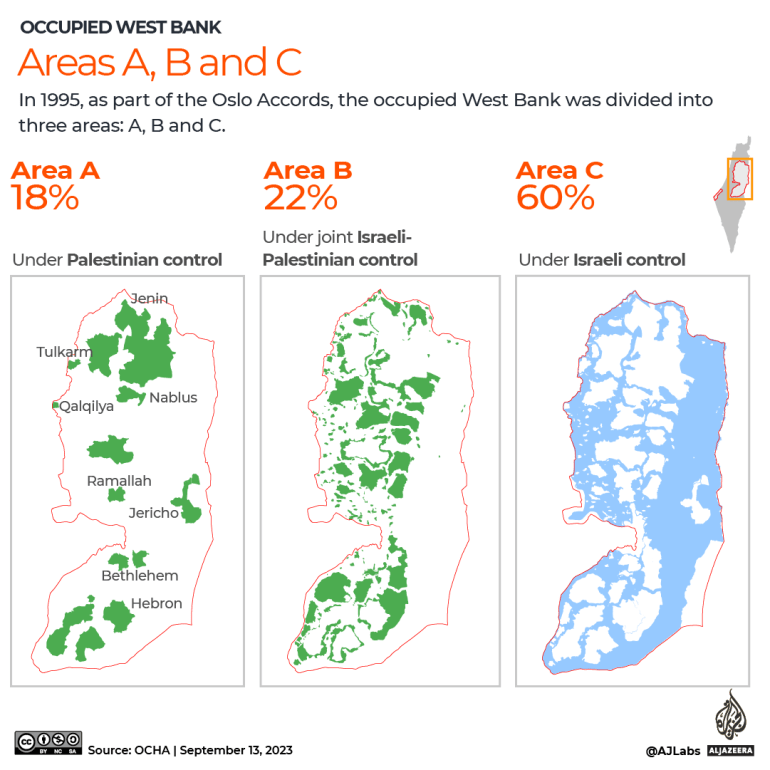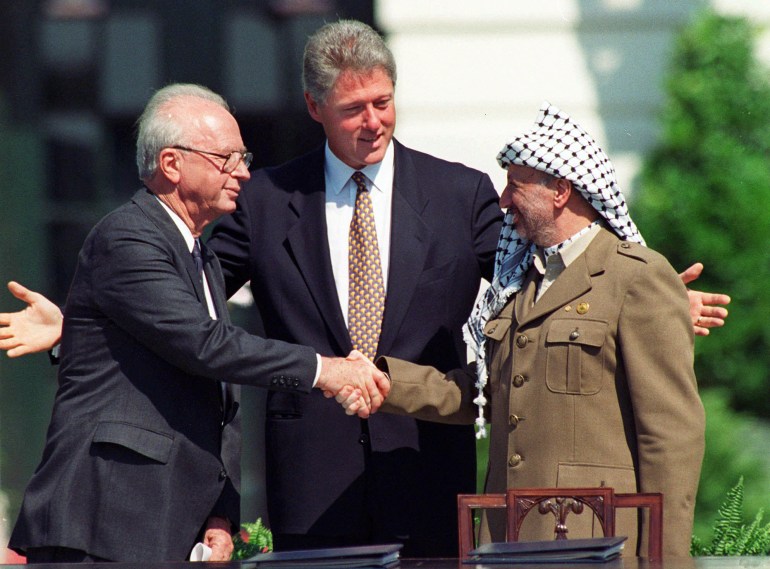‘Olive branches, victory signs’: How Oslo Accords failed the Palestinians
The Oslo Accords were ‘inherently designed’ to serve Israel’s economic and security dominance over the Palestinians, experts say.

On September 13, 1993, Saadeh Ersheid recalled being among dozens of people strolling the streets of Jenin in the occupied West Bank.
Many cheered and flashed victory signs while others were left perplexed at the news coming out of the United States.
Keep reading
list of 3 itemsIsrael forces kill three Palestinians in occupied West Bank attack
Two Palestinians killed by Israeli army, settlers in West Bank violence
Palestinian leaders had just officially recognised Israel’s existence as a legitimate state, hoping that, in turn, they would be able to establish their own.
Televisions in the homes of millions of Palestinians showed the moment Palestinian Liberation Organisation leader Yasir Arafat and Israeli Prime Minister Yitzhak Rabin shook hands outside the White House, marking the end of months-long negotiations that culminated in the signing of the Oslo Accords.
“I remember seeing a group of young men rush over to an Israeli army vehicle, grasping and climbing onto it to place olive branches on its hood,” 68-year-old Ersheid, a writer and political analyst, told Al Jazeera.
“The scene amused Israeli soldiers, who scorned and ridiculed the young men.”

The so-called peace deal came after years of a crippling financial crisis within the PLO, and after the brutal Israeli suppression of Palestinian resistance. It marked the end of the first Intifada, or uprising, in which more than 1,000 Palestinians were killed.
Many Palestinians were in a “state of misery”, Ersheid recalled, until the US-brokered accords were announced.
“Oslo was presented to them as a victory, or at least, as a helping hand to save them from this bad situation,” he said.
The second part of the accords were signed in 1995, with the aim of kick-starting talks with a two-state solution as the objective; specifically an independent Palestinian state through the establishment of an interim Palestinian government – the Palestinian Authority (PA).
The accords set the framework for Palestinian elections, and the PA was given a five-year lifespan. But the provisional government still exists today, plagued by allegations of corruption and police brutality.
Despite being granted limited self-rule in parts of the West Bank, Israel has maintained military control over the entire area.
Experts have said the accords were designed to ensure Israel’s economic and security dominance over the Palestinians, instead of facilitating a tangible deal.

Why were the accords a failure?
To Palestinian leaders, the accords were doomed to fail.
Major sticking points were left unresolved at the time of the signing of the accords. These included concerns about territory, illegal Jewish settlements, the status of Jerusalem, Palestinian refugees and the right of return.
Among other things, they also introduced the controversial security coordination between Israel and the PA.
But to Israel, the accords were not a failure, Osamah Khalil, professor of US and Middle East history at Syracuse University, said.
“Israel had no intention of agreeing to the emergence of a viable, contiguous, and independent Palestinian state,” Khalil told Al Jazeera.
“Israel was able to pursue its occupation and settlement policies with the political cover of endless negotiations,” he said.
Alaa Tartir, director of SIPRI’s Middle East and North Africa Programme, agreed. He said the accords offered Israel an internationally sponsored framework to “sustain its occupation and solidify its colonial control over Palestine and the Palestinian people” over the past 30 years.
They were inherently “designed and structured” so as not to bring the Palestinians closer to freedom and self-determination, Tartir told Al Jazeera.
The absence of a final deal has largely dictated the way Israel has exerted its control through the present. Reports by leading human rights organisations have argued that Israel has maintained a system of apartheid over Palestinians.
All the while, the PA has done little to stop successive Israeli governments from expanding illegal Jewish settlements, restricting Palestinians’ freedom of movement, taking Palestinian resources and arresting Palestinians on a near-daily basis.
Before the accords were signed, Israel mainly dealt with the daily life of Palestinians “from a security perspective”, Ersheid said.
“They ensured people were not engaged in activities relating to the resistance and pushed them to accept the idea of making peace with the occupation,” he said.
According to him, Israel often facilitated work opportunities for Palestinians by issuing permits or by easing other factors involved to “distract” them.
“If people worked, it was at the expense of their participation in national movements and in the resistance,” he said.
But the realities of Israeli occupation and its “brutality” were still very much apparent, prior to the first Intifada, Ersheid added. Random checkpoints were set up, while arrests, home demolitions, and the expropriation of lands were very common.
The occupation became even harsher after the first Intifada. “They continued to occupy us but this time, with an iron fist,” Ersheid said.
Rabin, who was Israel’s defence minister at the time, ordered Israeli army commanders to break the bones of Palestinian protesters. This happened to anyone “resisting in the streets”, Ersheid recalled.
Undermining Palestinian unity
The six-year Intifada was characterised by popular mobilisation, mass protests, civil disobedience, as well as boycott movements that aimed to fuel the national economy.
It was not enough to bring about economic autonomy. Palestinians in the West Bank were banned from working in Israel, and the PLO’s funds had started to rapidly deplete after being pushed out of Lebanon following the country’s civil war.
In fact, the PLO had reportedly signalled to the United States and Israel that it was willing to enter into a mutual recognition agreement as early as 1981.
By 1993, the regional and international landscapes were “highly unfavourable to the PLO”, Khalil said.
According to Khalil, the accords have also been devastating to Palestinian unity.
Geographically, Palestinians were divided between the West Bank, Gaza, and East Jerusalem. There are also Palestinian refugees in exile, in the diaspora, and Palestinian citizens of Israel.
This fragmentation was “exacerbated by political rifts” over the accords, Khalil said.
Tartir also noted that the accords made Palestinians “weaker, more fragmented, and further away from statehood”.
The accords also ensured that all aspects of the Palestinian economy, including trade and agriculture, would always be dependent on Israel.
Despite this, the PA has done little over the years to improve the economic situation for Palestinians, many of whom have resorted to working in Israel as low-skilled workers.
The PA has relied heavily on international donors and foreign aid for survival and has long used the bulk of funds to pay the salaries of civil servants instead of investing in the local infrastructure.
There has remained a of lack adequate leadership that can act as a viable alternative to the PA, mainly due to PA policies – in coordination with Israel – adopted to crush dissent.
The last presidential elections took place in 2005, during which a major rift emerged between Fatah – the party that heads the PA, and Hamas – the group that has governed Gaza since 2007. Multiple efforts to reach a deal to end their divide have been unsuccessful.
According to Khalil, the PA was only intended to “administer the accords”. It was never meant to be the representative of the Palestinian people. But the PA has now entrenched itself along with its limited power.
“The leadership of the Palestinian Authority, as well as the United States and Israel, do not want new elections,” Khalil said. “Unless they can ensure that their hand-picked candidates will win.”